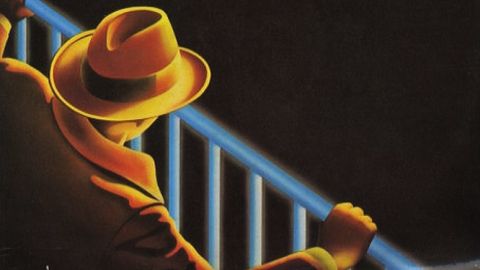David ‘Kid’ Jensen’s intro went: “And now, with strings and things, it’s Gordon Giltrap, Heartsong!”, and with that the Top Of The Pops audience witnessed the guitar virtuoso’s moment of glory, after more than a decade of folk-club toil and prolific recording. In a ‘Greek waiter’ phase (de rigueur perm and moustache), Giltrap performed the jaunty instrumental with notable vigour as it climbed the hit parade, and parent album Perilous Journey did the same.
That mainstream moment was just a line in a story already many chapters in. Giltrap started as a teenage prodigy on the same circuit as Bert Jansch and Mike Oldfield, and made some albums on the storied Transatlantic label. Esoteric now affords him the expanded reissue routine for a canon made during his ‘crossover’ era, after signing for the new Electric label.
1976’s Visionary was full of those proverbial strings and things – Rod Edwards’ wafting synths, the sympathetic percussion of a young Simon Phillips, a range of influences. From The Four Winds, for instance, is almost Tudor in lineage, Gordon and his minstrels seemingly strumming in the court of old Harry VIII, awaiting the invention of electricity. But there are Hispanic vibes afoot too, even in that piece, and in the maracas of Lucifer’s Cage, the fanfares of The Price Of Experience and Giltrap’s acoustic dexterity.
His later TV work, writing themes or having his music used for them, is reflected on a disc that almost sounds like an entire score album. It’s now augmented by, among others, a previously unissued Concerto, in three movements. Perilous Journey (1977) was the one with the Whistle Test-style cover, and that Heartsong hit.
Gently progressive in the face of punk, it featured the same band (with John G. Perry on bass) and moved into more mainstream topography on songs such as opener Quest, Giltrap’s heavy-strumming acoustic attack playing against strident synthesised strings. This also has the bonus 21-minute masterclass Guitar And Piano Demos, and an outtake of Oh Well confirming his occasionally evident spiritual affiliation to Peter Green.
On 1978’s Fear Of The Dark, Gordon was still happy to share the spotlight, Nightrider featuring flute detail while Weary Eyes serves quality cornball MOR – vocals, harmonies and Giltrap channelling a latter-day Hank Marvin. The title track is much more the atmospheric prog ticket, and if the bonus version of Jerusalem is an adaptation too far for some; the Theme From The Waltons certainly is.
In all though, this is a welcome return to some of Giltrap’s glory years.


